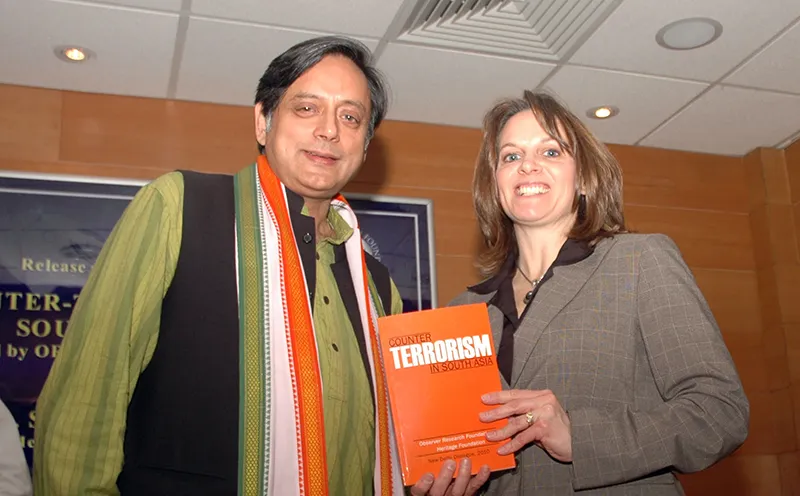Drawing on his immense knowledge as a former UN career diplomat, Dr. Shashi Tharoor, suggested enforcement of various instruments of the United Nations to force Pakistan to comply with its counterterrorism commitments.

Dr. Shashi Tharoor, Member of Parliament, today advocated effective use of United Nations mechanisms to check terrorism from the soil of Pakistan. Releasing a book on ’Counter Terrorism in South Asia’, published jointly by Observer Research Foundation and The Heritage Foundation of the United States, Dr. Tharoor said inadequate counter-terrorism efforts have allowed Pakistan to continue with the use of terrorism as an ’instrument of state policy’.
Dr. Tharoor, a former Under Secretary General of the UN, said employing the full range of instruments available with the United Nations will pressure Pakistan to reevaluate its national security calculus.
Dr. Tharoor, also a former Minister of State for External Affairs, spoke of the transnational nature of terrorism that has affected India for the last three decades. On Pakistan, he was categorical saying that ’the combination of the military domination of the state institutions and radicalisation of the society was a matter of compelling and urgent concern…’ He also explained how Pakistan’s military consumes the greatest share of the budget in spite of pressing issues such as illiteracy and insufficient infrastructure. Pakistan’s hostility with India, the Parliamentarian added, serves as the only justification for Pakistan army to retain its preeminence in Pakistan’s state and society. He also emphasised the misguided policy of the United States to ’have found it expedient to treat with them as if they have the same enemies as we do. But others do not have the same enemies as we do. They are the enemies we have.’
Drawing on his immense knowledge as a former UN career diplomat, Dr. Tharoor, suggested enforcement of various UN instruments to force Pakistan to comply with its counterterrorism commitments. Dr. Tharoor pointed out that India’s chairmanship of the UN Counter Terrorism Committee places it in a unique position to introduce new reassures to check Pakistan’s current strategy. ’The Committee has been rather lax in questioning Pakistan about its lack of compliance on some of the basic requirements including reporting the movement of suspected terrorists, exporting terrorism, financial transfers, arms transfers etc,’ Dr. Tharoor said. He further suggested that the UN should reassess Pakistan’s "compliance with the Security Council determination on the Security Council determination on the Chapter 7 of the UN Charter which is binding on all States, including Pakistan". Further, he also raised the possibility of sanctions, restrictions of travel, funds etc.
Mr. Vikram Sood, Vice President of the ORF Centre for International Relations, earlier delivering the welcome address, highlighted the enormity of the challenges facing Pakistan, citing the Raymond Davis case which he said illustrated the mindset of the people who rule from Rawalpindi. He also pointed out that the reaction to the Salman Taseer murder showed how radicalised the Pakistani society has become and how weak the country’s liberal society is today’.
Dr. Lisa Curtis of The Heritage Foundation, who wrote on the US strategy in Afghanistan, endorsed the recent announcement of the Obama Administration to extend active counterinsurgency operations and troop presence till 2014. She said last year’s surge of 30,000 troops has begun to show positive results in Taliban strongholds in southern and eastern Afghanistan.
Mr. Wilson John of ORF, whose chapter documents the degree of radicalisation of state institutions in South Asia, rubbished the notion of ’rogue elements’ within Pakistan security apparatus who aid terrorist groups without official sanction and accused Pakistani state elements of direct involvement in the Mumbai terrorist attack of 2008. He said that Pakistan’s counter-terrorism actions have only angered and further radicalised large sections of the country’s society.
’Counter Terrorism in South Asia’, released in Delhi on Tuesday, February 22, is a collection of papers presented during a two-day seminar organised by the ORF and The Heritage Foundation, Washington, earlier in 2010. The chapters are written by faculties of the two participating institutes and experts like Amb. Leela Ponappa, Mr. Siddharth Varadarajan, Sheriff Lee Baca (Los Angeles Sheriff Department) and Dr. Daniel Twining.
(This report is prepared by Kaustav Chakrabarti, Junior Fellow, Observer Research Foundation)
The views expressed above belong to the author(s). ORF research and analyses now available on Telegram! Click here to access our curated content — blogs, longforms and interviews.




 PREV
PREV

